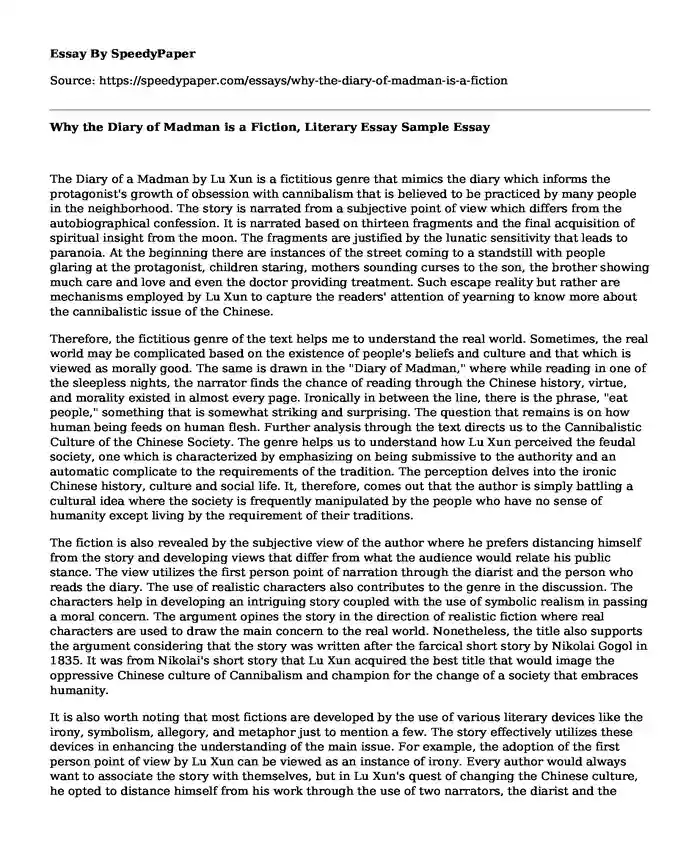
| Type of paper: | Essay |
| Categories: | Literature |
| Pages: | 4 |
| Wordcount: | 861 words |
The Diary of a Madman by Lu Xun is a fictitious genre that mimics the diary which informs the protagonist's growth of obsession with cannibalism that is believed to be practiced by many people in the neighborhood. The story is narrated from a subjective point of view which differs from the autobiographical confession. It is narrated based on thirteen fragments and the final acquisition of spiritual insight from the moon. The fragments are justified by the lunatic sensitivity that leads to paranoia. At the beginning there are instances of the street coming to a standstill with people glaring at the protagonist, children staring, mothers sounding curses to the son, the brother showing much care and love and even the doctor providing treatment. Such escape reality but rather are mechanisms employed by Lu Xun to capture the readers' attention of yearning to know more about the cannibalistic issue of the Chinese.
Therefore, the fictitious genre of the text helps me to understand the real world. Sometimes, the real world may be complicated based on the existence of people's beliefs and culture and that which is viewed as morally good. The same is drawn in the "Diary of Madman," where while reading in one of the sleepless nights, the narrator finds the chance of reading through the Chinese history, virtue, and morality existed in almost every page. Ironically in between the line, there is the phrase, "eat people," something that is somewhat striking and surprising. The question that remains is on how human being feeds on human flesh. Further analysis through the text directs us to the Cannibalistic Culture of the Chinese Society. The genre helps us to understand how Lu Xun perceived the feudal society, one which is characterized by emphasizing on being submissive to the authority and an automatic complicate to the requirements of the tradition. The perception delves into the ironic Chinese history, culture and social life. It, therefore, comes out that the author is simply battling a cultural idea where the society is frequently manipulated by the people who have no sense of humanity except living by the requirement of their traditions.
The fiction is also revealed by the subjective view of the author where he prefers distancing himself from the story and developing views that differ from what the audience would relate his public stance. The view utilizes the first person point of narration through the diarist and the person who reads the diary. The use of realistic characters also contributes to the genre in the discussion. The characters help in developing an intriguing story coupled with the use of symbolic realism in passing a moral concern. The argument opines the story in the direction of realistic fiction where real characters are used to draw the main concern to the real world. Nonetheless, the title also supports the argument considering that the story was written after the farcical short story by Nikolai Gogol in 1835. It was from Nikolai's short story that Lu Xun acquired the best title that would image the oppressive Chinese culture of Cannibalism and champion for the change of a society that embraces humanity.
It is also worth noting that most fictions are developed by the use of various literary devices like the irony, symbolism, allegory, and metaphor just to mention a few. The story effectively utilizes these devices in enhancing the understanding of the main issue. For example, the adoption of the first person point of view by Lu Xun can be viewed as an instance of irony. Every author would always want to associate the story with themselves, but in Lu Xun's quest of changing the Chinese culture, he opted to distance himself from his work through the use of two narrators, the diarist and the person who participates in reading the diary. Cannibalism also exists as a symbolic theme which informs of the historical practices or the primitive and radical cultures that the Chinese embraced. Cannibalism can also be interpreted as a parody that defined the traditional Confucian Scholarship. The justification is on the adoption of the view of the madman being a social critic and rebel whose madness is not the typical one but a kind of sanity.
The basic principles of the genre mainly influence the kind of analysis, interpretation, and placement of the text into a fiction story. They include; the point of view, characterization, the plot, conflict and lastly the conclusion. The story as imaged earlier is written in first person point of view and utilizes real characters hence drawing the main issue to the real world. The conflict discussed is in the radical Chinese culture which embraced the idea of feeding on human flesh, an issue which made the protagonist not have peace with even the brother.
Conclusion
The text, Diary of a Madman by Lu Xun, fits into the genre of fiction based on its aim of assisting the readers to understand the reality of the Chinese Society. The reality is discussed in details through the radical culture which was characterized by feeding on human flesh. Other reasons are on its embracement of the various literary devices and the conformity to the basic fiction principles.
Cite this page
Why the Diary of Madman is a Fiction, Literary Essay Sample. (2022, Apr 28). Retrieved from https://speedypaper.net/essays/why-the-diary-of-madman-is-a-fiction
Request Removal
If you are the original author of this essay and no longer wish to have it published on the SpeedyPaper website, please click below to request its removal:
- Mandarin Oriental Business Proposal Essay Example
- Art Essay Example about The High Dam of Alexandria
- Essay Sample on Becoming Vegan
- Essay Sample on Tense relationship
- Essay Example on How Substance Abuse and Conflict Affects Parents and Children
- Essay Sample on Health Care Insurance Plan: Medicare for All
- Essay Example - Israeli-Palestine Relations
Popular categories




